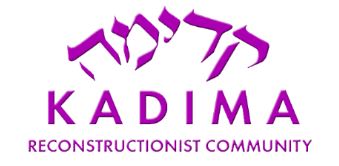Va’adat Teshuva
Kadima's Internal, Communal, Structural Equity and Social Justice Initiative
Kadima is working to build a progressive community of inclusion, social justice, and Jewish tradition for Jews and our allies. Kadima is committed to nurturing a leadership body that can support the organization’s staff, board, and membership in a way that centers equity, inclusion, social justice, and our collective liberation. Our leadership recognizes that these values are currently aspirational and that much work is needed to support our growth in the areas of equity, radical inclusion, communication and conflict across difference. Kadima is currently in a process of understanding how oppression is playing out within our community, and our first step is engaging in conversations.
These conversations are a first step in a longer and ongoing process for Kadima to make changes to the organization to challenge oppression. In this first phase, the Va'adat Teshuva, composed of Board Members, Kadima members, staff, and our consultant, Amanda, will interview a number of current and former members to elicit honest feedback about the impacts of experiences with oppression* in our congregation.
Following these conversations, the Va’adat Teshuva will look at themes that emerged and will be working with Amanda to identify short- and longer-term action steps.
These steps may include:
We invite anyone who engages in these conversations to get involved in Va'adat Teshuva. Accountability in this process is to listen to and center the needs of folks who have experienced harm at Kadima and those most marginalized in our community and historically. This process will include multiple phases and many chances to give feedback, share experiences and be part of leading this work.
As this process moves forward, we will need each member of our community to take an active role in helping us live into our values. Everyone has a role in this work!
We seek to be transparent in this process, and we are always learning. If you have questions or feedback, please contact Julianna (Board Co-President) .
*The Va’adat Teshuva understands oppression in the context of a broader unequal society in which there is domination of one group of people for the benefit of another (Source: The School of Unity and Liberation). Oppression is part of institutions, ideologies, interpersonal dynamics and internalized self-perceptions.
These conversations are a first step in a longer and ongoing process for Kadima to make changes to the organization to challenge oppression. In this first phase, the Va'adat Teshuva, composed of Board Members, Kadima members, staff, and our consultant, Amanda, will interview a number of current and former members to elicit honest feedback about the impacts of experiences with oppression* in our congregation.
Following these conversations, the Va’adat Teshuva will look at themes that emerged and will be working with Amanda to identify short- and longer-term action steps.
These steps may include:
- Developing a process to address harm or conflict through the lens of power and oppression;
- Refining our community values towards greater accountability to our commitment to disability justice, anti-racism, anti-transphobia, and economic justice;
- Anti-oppression* trainings and workshops;
- and establishing processes and norms for cultivating and supporting leadership especially for members who hold marginalized identities.
We invite anyone who engages in these conversations to get involved in Va'adat Teshuva. Accountability in this process is to listen to and center the needs of folks who have experienced harm at Kadima and those most marginalized in our community and historically. This process will include multiple phases and many chances to give feedback, share experiences and be part of leading this work.
As this process moves forward, we will need each member of our community to take an active role in helping us live into our values. Everyone has a role in this work!
We seek to be transparent in this process, and we are always learning. If you have questions or feedback, please contact Julianna (Board Co-President) .
*The Va’adat Teshuva understands oppression in the context of a broader unequal society in which there is domination of one group of people for the benefit of another (Source: The School of Unity and Liberation). Oppression is part of institutions, ideologies, interpersonal dynamics and internalized self-perceptions.
- Institutionally, oppression shows up as policies that create greater access to resources for privileged groups and harm groups targeted by oppression (e.g. a policy that privileges owning class or middle class members over working-class members by requiring all members of a community to pay the same number of dues; a policy that discriminates against trans gender and non-binary members by not having all gender bathrooms).
- Ideologically, oppression plays out in media and cultural narratives, often aimed at invisibilizing the systemic nature of oppression (e.g. the narrative perpetuated in major media outlets that police brutality is a result of a “few bad apples” in police departments)
- Interpersonally, oppression plays out through microaggressions which are “pervasive verbal, behavioral or environmental slights that—intentionally or not—communicate hostility” (for example, when a member of the congregations asks “When did you convert?” to a Jew of Color).
- Ideologically, oppression is aimed at forcing people to internalize views of themselves in line with cultural narratives of oppression and privilege/entitlement. Internalized oppression and entitlement can influence our self-perceptions (e.g. someone who identifies as LGBTQ may feel that there is something shameful in their experience whereas a straight cisgender person internalize a view that their experience is the “normal” or correct way to identify).
